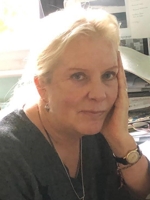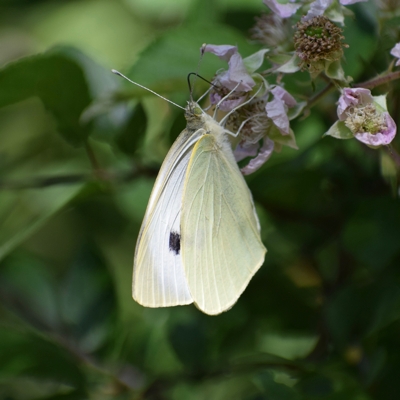Poems by Sue Proffitt
Archives: by Issue | by Author Name

Bees
by Sue Proffitt
From Canary Summer 2021
Sue lives in Hallsands, a remote settlement and beach situated in Start Bay, South Devon, England. Her favourite walk is from her cottage to Start Point, one of the most exposed peninsulas on the English coast, running sharply almost a mile into the sea. The lighthouse at the end of the headland has guided ships in passage along the English Channel for over 150 years, and the coastal cliffs are the oldest in Devon. The coastline here is still wild, and home to many wild flowers, birds and animals.

Squatting on the ground hunchback
next to a dry bank of earth
he didn’t look up when I bent down,
asked him what he was doing
just pointed – minute black holes
in the brown soil
and bees, innumerable.
Beneath chatter and engines
they hummed through my ears
one low note of total concentration,
placing one drop of nectar in each hole
for one egg. He told me this,
his eyes never leaving them
his delight as serious, as solemn
as the birth of a bee in a tunnel
succoured on nectar.
I remembered another man I saw
on his front lawn, aiming a canister
at violets purpling his grass,
their million open mouths
unable not to swallow,
and a man thrashing nettles
with a stick, his face contorted
leaving them mashed and ragged.
I remembered the fear in each of us -
see what is possible when a man
kneels down next to bees
and opens to them. What’s possible
for me when I open.
© Sue Proffitt
Cabbage Whites
by Sue Proffitt
From Canary Summer 2021

rising and falling
as if the Summer breeze
blows petals from its mouth
as if banks of yarrow
clotting the coastpath
surrender their bodies
as one to air – stem-threads
anchoring creamy rosettes
snapping – as if in the instant
I look up from weeding, planting
digging, hands full of soil
and metal, I remember
how to see faeries. As if
in that instant I remember
what I might see
on the periphery – how
I might choose only to see
what’s sideways and on the edge –
as if I remember that lockdown
is a habit of mind
a fist pressed to the eyes -
as if I expect to see this again
and again, like a gift
meant for me
and not a signal –
a hand waving
farewell.
© Sue Proffitt
The disappearing
by Sue Proffitt
From Canary Fall 2021
Wildcat. Red squirrel. Watervole. Hazel dormouse. Hedgehog.
Intone them solemnly
as if this makes them real, as if mouth, tongue against teeth,
small plosives, exhalations,
summons each one before me. Three of these I’ve never seen.
Flash their images
up on a screen as if this makes them real. Somewhere, the last ones
occupy pockets
of ravaged cloth – Earth’s skin crumbling to dust – we’re left with
something bleached,
exposed, like the small relic of curves and holes I found yesterday
on the Tor in a litter
of granite. I picked it up: slippery tendons, bundles of nerves once
flowed through
each socket; this once held a river, pulsing. I put it in my pocket,
and do I do this
to soften the loneliness of its death? (Imagining this.) The truth is that
none of the disappearing
know self-pity. There’s a bird – I don’t know its name, it doesn’t know
our name for it –
but it hears nothing answer when it announces itself over and over,
meeting only
other different names and a silence which is unblinking, which doesn’t
look away.
Something announces itself in the mind, the heart. It’s time.
The disappearing
know the edges of themselves creep closer every day. My hand clutches
its bit of bone
as if holding something back.

© Sue Proffitt
What's leaving me
by Sue Proffitt
From Canary Fall 2021
Something’s changed in the heart. A giving-up. Not true, because
look at the body – its insistence
on multiplying cells, its obstinate battery refusing to putter out
yet. I’m not hungry, but I will be.
Here’s my coffee, to hand. All the signs of pressing on, regardless.
My words insist, still, on arriving,
like the spiders in the laboratory whose webs were systematically
destroyed every morning,
who continued to weave. An experiment in hope – can it be killed?
I don’t know how long
it took; I see those small engineers staying up many nights, spinning –
perfect architecture held,
prismatic, in their brains: it’s what I do. It’s who I am. Until something
changes. A knowing, heavier
than stone, heavier than anything tied to a body and thrown into water –
sinks in, right to the bottom.
Not a carelessness but an absence of hope, intimate with demolition,
moves in, oversees
disintegratation. In the end, a few threads any old how, knotted.

© Sue Proffitt